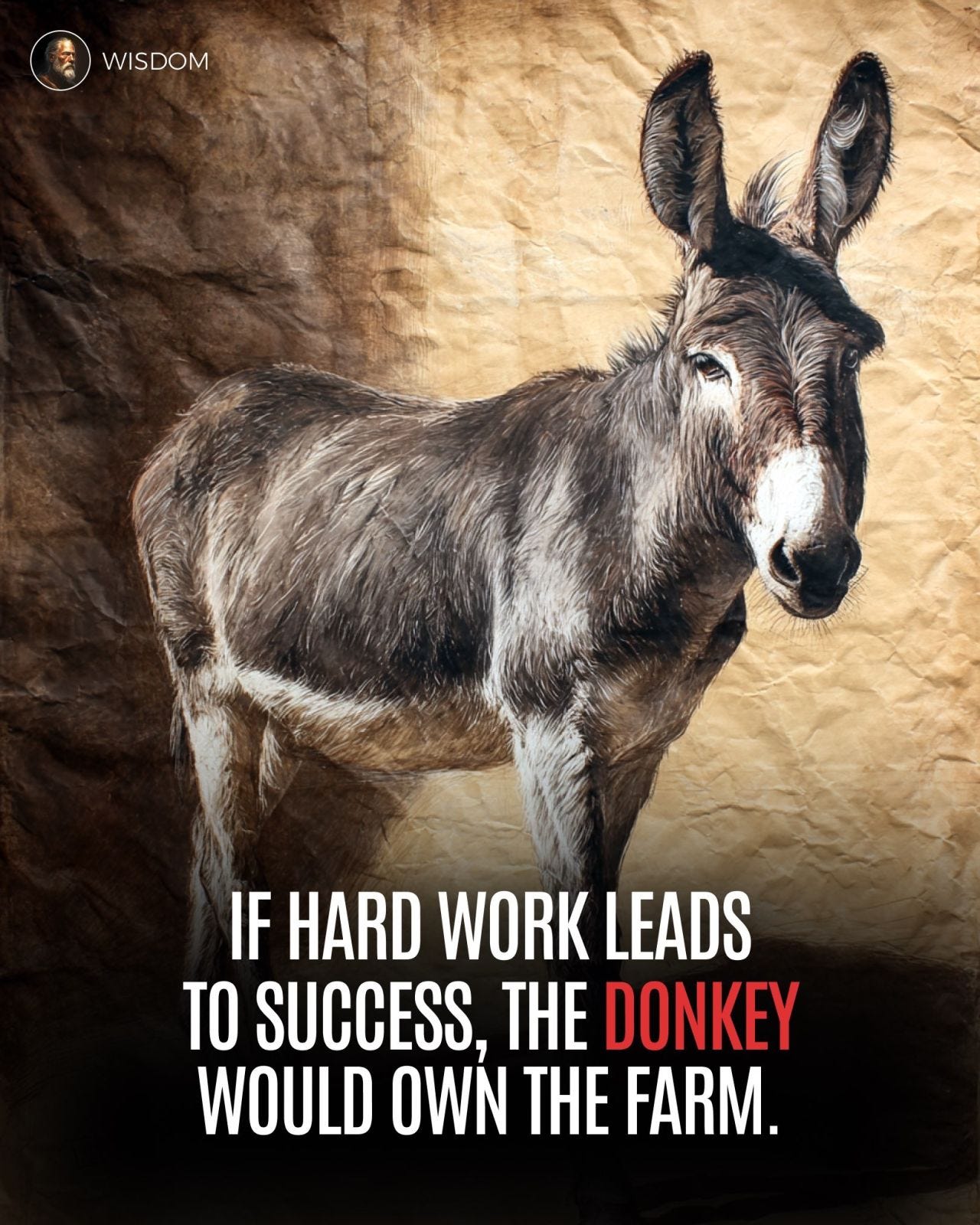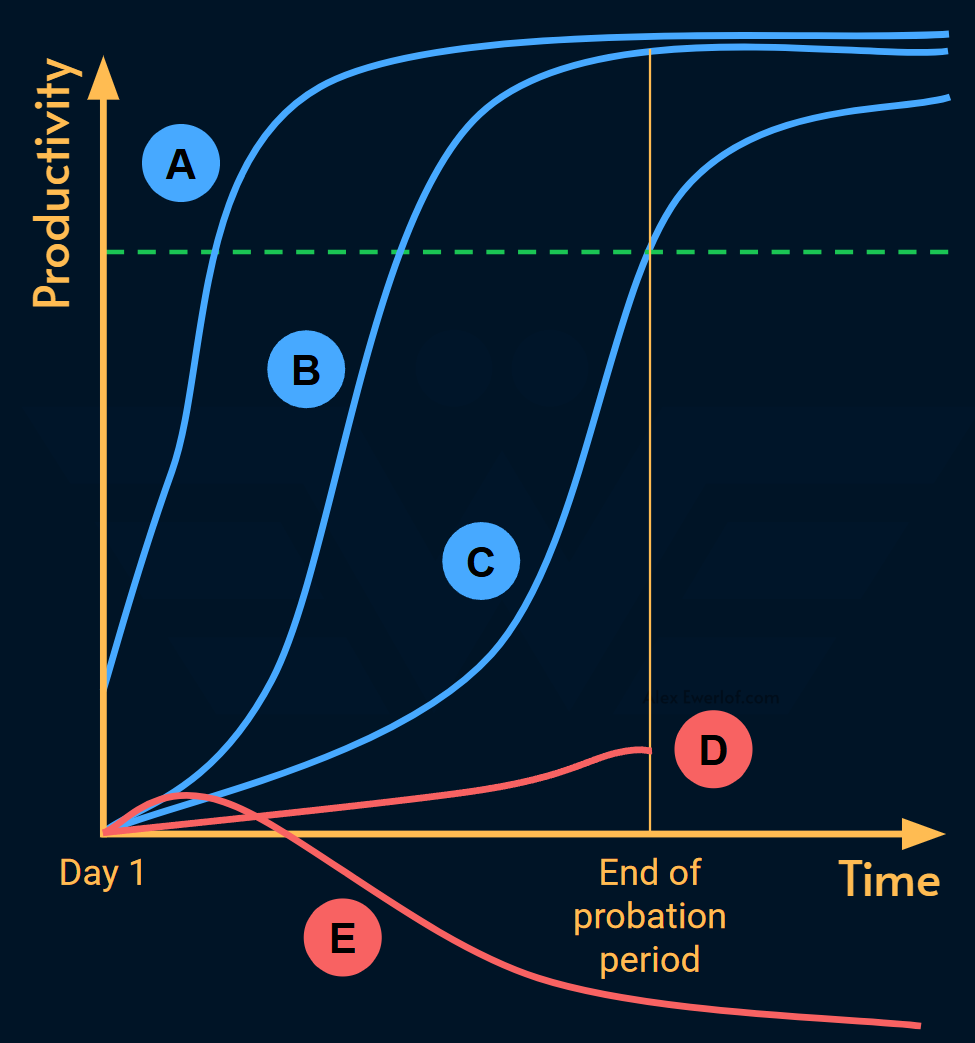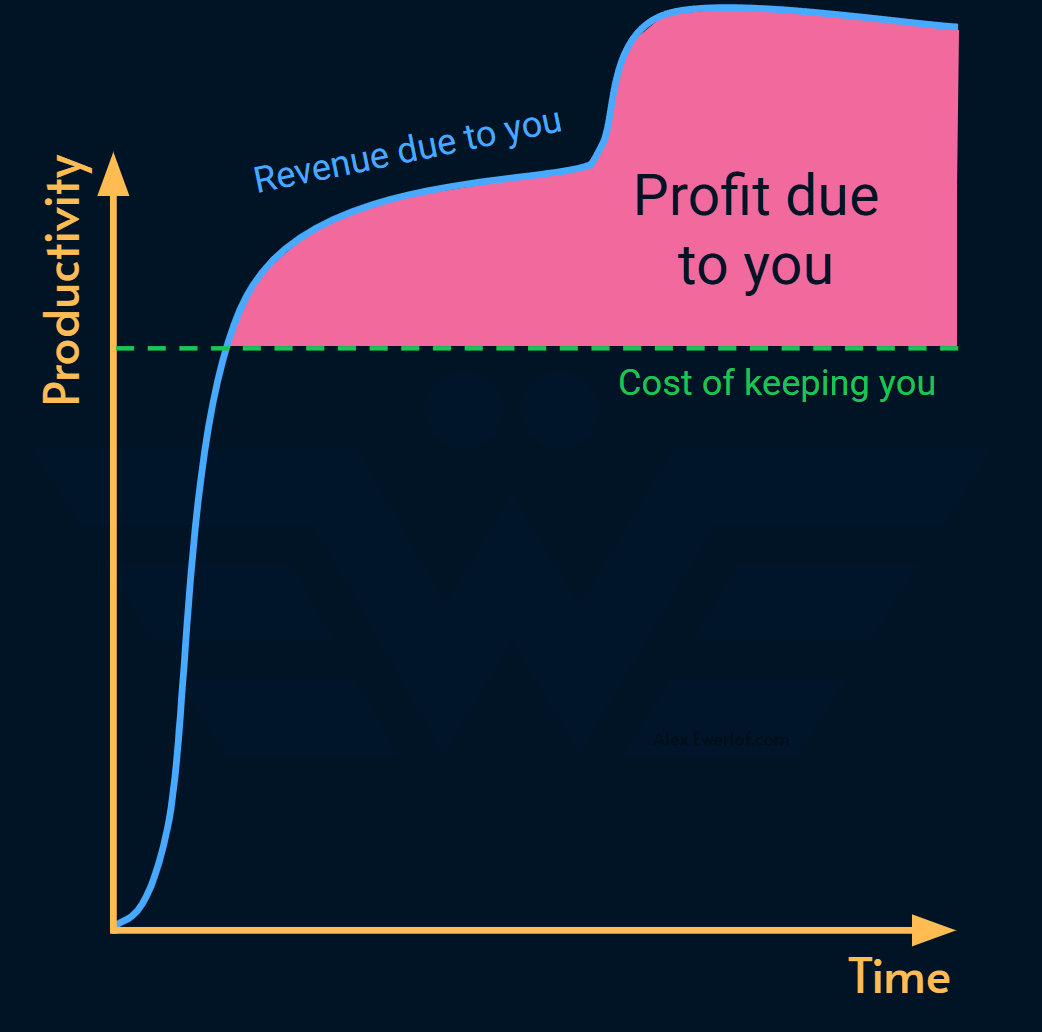Your business value
You should always generate more value than the perks the company puts on the table.
On day one of starting a new job, you're typically generating zero value for the business in terms of solving customer problems.
Regardless, you are paid your full salary.
The company is taking a bet on you. 💸 The hope is that at some point you generate more value than the salary, perks, and other expenses: workspace, computer, internet, coffee, management overhead, etc.
You should always aim to generate more value than those costs. That's how the business can afford to keep you.
There are exceptions to this model but spoiler alert: it's politics and evil stuff, as we’ll get to.
This post is part 1 of a short series that explores this mental model. A follow up post digs into how to take advantage of this model to optimize your growth by always staying above the curve. As a side effect, your compensation usually follows.
Since I've applied this strategy, my salary has tripled, and I went up the ladder that allows me to deliver more impact and stay relevant in the job market. I truly believe in this mental model at an individual level despite being difficult to quantify.
🤖🚫 No generative AI was used to create this content. This page is only intended for human consumption and is NOT allowed to be used for machine training including but not limited to LLMs. Copyright (C) 2025 Alex Ewerlöf. All rights reserved. (why?)
Start from zero
When you start a new job, you are setting up your computer, getting access, installing software, getting to know the team, reading the docs, etc.
You are usually not solving problems that helps the business make money on day one.
In fact, the collective company productivity may take a hit because others have to spend time onboarding you instead of doing their regular work. But let’s stick with zero for now. 😄
Ambitious people want to fly. Cut their wings and they’ll walk out.
For the sake of simplicity let’s skip the discussion about how to measure productivity because as we’ll see, that discussion is not a key point of this mental model. As much as I hate diagrams without actual numbers, let’s focus on the curves and key points.
If you have a fixed salary like most people, your day 1 compensation isn’t different than your day 30! The company pays you for your potential:
The company made a bet on you. They expectation is for your contributions to surpass your cost over time:
Your contributions to the company should ALWAYS be above the salary, perks, and other costs (e.g. computer, phone, workspace, coffee, internet, travel expenses, management overhead, etc.)
A couple of points:
profit = revenue - expensesproductivity = output / inputRegardless of the compassion and empathy of leadership, at the end of the day (or quarter) a company is a legal entity that acts as an efficiency optimizing machine driven by profit.
It’s hard to measure productivity.
It’s even harder to measure individual productivity due to interdependencies. In reality, companies make a profit from the collective effort of their employees (and bots, and AI agents, if you’re reading this in the future 🤖😄).
It’s impossible to put a number on human beings. Using the words “loss” or “cost” may throw some people off.
It is particularly hard to quantify the value of jobs that mitigate risks (e.g. reliability, security, etc.). Do you remember how the recent pandemic highlighted the essential workers? The nurses, delivery truck drivers, cleaners, grocery store personnel, teachers, etc.? Those jobs typically don't pay as much as some flashy office jobs, but they are critical nonetheless. It's hard to justify the value of a job that prevents a risk without that risk first materializing and delivering full damage.
It helps to take an honest look at your contributions from time to time and self-assess how much of the business revenue is due to you and whether you’re actually working your worth. One way to understand that would be to ask: how would it look like if I didn’t join the company.
Companies that ignore reality will get punished by going bankrupt there’s no more money left to burn (unless the government bails them out 💰)
Individuals who ignore reality will get punished by getting fired when there’s no more money left to burn.
S-curve
Growth usually follows a S-curve. The S-curve takes different forms for different people.
Companies usually have a deadline for the bet place on you (AKA probation period):
Person A had a quick onboarding. Maybe, they were already familiar with the tech, product, operation model, or people.
Person C barely made it; possibly due to poor onboarding, or the need to unlearn what they already know in order to learn enough to be productive at the new job.
Person D unfortunately didn’t make it. Maybe with more time and support person D would have made it, but there’s nothing in the formal definition of a company that requires that. It would be nice but it’s not a legal requirement.
Just a reminder that your work performance and productivity have nothing to do with you as a person. A person with a great personality may have poor performance due to environmental mismatch, poor leadership, bad onboarding, biases like horn effect or gender/age/ethnic discrimination, etc.
Companies typically fire someone who performs below expectations instead of spending the resources to lift them up.
Although very rare, but some people objectively hurt the collective productivity of the company like person E here:
If person E has a leadership position, they can hurt the productivity of an entire organization and cause serious damage before the company takes notice and acts. That’s because leadership acts as a force multiplier and if the force is negative, it can hurt the productivity of many people. Coincidentally, assessing the performance of leadership positions is exponentially harder than an engineer at the leaf nodes of the org.
In an age that everyone and their dog has a whitepaper for measuring developer productivity (even McKiensey taking a stab at it), you can rarely find a way to objectively measure the performance of leadership positions.
Will person E be fired immediately? Not necessarily.
That’s because when the company itself is led by incompetent leaders, the appearance of productivity is as payable as actual productivity.
Why does person E do that?
Drive for efficiency: Humans, as part of nature, seek efficiency: almost everyone wants maximal pay for minimal effort. If it’s possible, some people eventually end up doing it. People usually have a hard time walking away from a well-paid position even if it’s above their capacity.
Dunning-Kruger effect: The Dunning-Kruger effect is a cognitive bias where people with limited knowledge or expertise in a given domain tend to overestimate their own competence, while those with high expertise tend to underestimate their abilities relative to others. Person E may genuinely be unaware of their damage.
Measuring productivity is hard: There are biases at play but not everything is quantifiable to a neat diagram like the ones in this article. Plus, the more strategic a position, the longer time it takes to properly assess its impact.
Perception: Incompetent managers don’t have a way to tell the difference between real work and fake work. These are the same leaders who confuse confidence for competence and eloquence for substance.
This is particularly common at organizations with high DTT (distance to top). Unproductive employees hide in the cracks of tall silos with thick walls and feast on politics. We’ve covered that concept along with Vertical and Horizontal Organizational Distance (VOD/HOD) in another article:
Perception of productivity
As you saw with person E, the perception of productivity is important in the context of assessing the bet the company has placed.
The opposite of person E is someone who is too busy doing the actual work to care whether it is acknowledged.
Sadly, this is way more common than person E. Look at person F:
A few years ago, I learned about “internal marketing” which is exactly what it sounds: if you’re doing the work, make sure that it’s also noticed, especially if you have long term plans to stay at the company.

Regardless if you want to stay or not, it helps to get noticed for the value you generate so that you can be in control of your career and it doesn’t end prematurely.
There are many tools for internal marketing which is the topic of another article:
Demos: show what you’ve done (can be consumed async as a video recording for example)
Mentoring: helping grow others can spreads the word about your skills
Weekly reporting up: to keep you manager close and in the loop so they can fight for you when needed
Dotted reporting lines: key people across the org that you meet regularly
Asking for a skip level: meeting people with VOD > 1
Write-up: documents travel far wider than F2F meetings. Blogging is an example but even internal documents work well.
Anything else you want to add to this list?
It’s important not to overdue it because it may backfire and come across as you don’t have anything better to do than being your own personal cheerleader.
Raise
Most of the learning happens at the start. Over time, you get better at your job and your productivity gradually increases.
The company may try to keep you by throwing some money back in form a raise:
As an optimization machine, the company isn’t motivated to give that bump voluntarily. 2 conditions need to be met:
The cost of losing you is higher than keeping you. i.e., there’s reasonable risk to believe that the compensation bump is an investment —something that the business can relate to.
Your elevated productivity is visible. Whether humans do the assessment or some bot, visibility of your work plays an important role in whether you get the bump or not. We’ll talk more about visibility later.
Unfortunately, some employees choose to hoard knowledge to use it as leverage to get a raise. While it typically works, it has severe drawbacks for your experience growth. In the follow up article we’ll talk about alternatives to this strategy.
Market shrink
It doesn’t matter how efficient you are at your job, if it’s not also effectively helping the company to solve customer’s problems.
Companies don’t operate in vacuum:
There needs to a market to monetize
Customers who are willing to pay for the solution
And a fit between customer needs at the price point they’re willing to pay
Then there’s competition and paradigm shifts that deprecate entire lines of business.
Based on the visuals we have built so far, your productivity in the scope of what the company can monetize looks like this:
Examples:
The business model gets deprecated: The company is in the business of renting DVDs and Netflix happens before the business had the chance to adapt to market demand.
Your services are irrelevant: You’re a SEO expert and suddenly AI can do it, plus search engines lose market to LLM-powered searches.
Your services aren’t required: Someone more skilled (or more connected) is hired and they take over your responsibilities, making you redundant.
Underpaid
These diagrams don’t have scales for a reason: it’s hard to put numbers that are scientifically true for all situations.
There’s no rule that says your business value should be 20% higher than the total expenses.
That’s not the point. The goal here is to identify key events (e.g. when your probation is over) and the curves.
This also means that you may be severely underpaid for what you contribute to the business. As long as the total value of your team, group, or organization is above a certain threshold, the business has tolerance for it.
You may be working extra to cover a productivity gap for your team:
Although you’re underpaid the value you generate, as long as the business is concerned, the whole group is doing what it’s supposed to do.
Same is true for workaholics who do way more than required. It can have many reasons:
Lack of clarity: it’s not easy to see the relationship between the value and expenses.
Meaning: they may not have something more interesting in their life outside work. Therefore work becomes life and gives it meaning.
Manipulation: there are many ways people get manipulated to work extra. The toolbox ranges from something as benign as praise to something as evil as bullying and threat to fire someone. Regardless, the end result is the same: generating disproportionally more value than expenses.
Inefficiency: You may have heard “work smarter, not harder”. Well, it’s not always clear what “smart” means in a given situation. When the work is not efficient, it’s easy to end up in a situation where brute force seen as the only alternative.
Quiet Quitting
Quiet quitting is when an employee does the minimum requirements of the job to keep it. There can be many reasons:
Demoralization or demotivation (e.g. due to bad culture)
Boredom or sickness (e.g. burning out)
Losing confidence in one’s ability to find a more fulfilling job, knowledge hoarding, getting too comfortable with what you know and failing to continuously learn, etc.
Lack of trust: you’re not sure that the leadership is taking the company to the right place, you don’t believe in the value of the business model to the society, you don’t trust your colleagues are pulling your weight, etc.
Any other reason that leads to someone intentionally reducing their productivity level dangerously low
Quiet Firing
This is a sad phenomenon: a productive person is forced into a situation where their productivity is less than their capability.
There’s often malice and politics at play. However, it’s fearful malice because instead of flat out firing the person, they are stripped away from power, knowledge, and opportunity to make an impact.
There may be many reasons for this:
You’re too good at your job and despite benefiting the business, this also comes across as a threat to poor performers (remember person E?)
You do your job fine, but you also have “extra deliveries” like speaking up your mind which over time can create powerful enemies that want to get rid of you (remember the story of Emperor’s New Clothes?)
Your seat is smaller than you, so while doing your job, you accidentally step on other peoples toes, and as a territorial species, it activates the fight response in some people. If you keep doing it long enough (or to enough powerful people), you may gradually be “managed out” (instead of giving constructive feedback, or providing an environment where your full potential can contribute to the business).
The cost of firing you is higher than keeping you until you voluntarily leave. This is the case when there’s no legal ground for firing you and there’s a high risk that you can sue your employer or damage their reputation if you’re fired.
There are many ways to quietly fire someone:
Exclude them from the room where the key discussions are held. If knowledge is power. Lack of knowledge reduces power.
Give them sh*ty assignments. Bore them to death so they pick up whatever is left of their dignity and quit.
As part of a reorg, reduce their responsibilities. Ambitious people want to fly. Cut their wings and they’ll walk out.
Quiet Hiring
With the end of ZIRP (zero interest rate), many companies went to efficiency-mode. Previously we’ve covered layoffs and used Spotify as an example:
TLDR; layoff is a last resort when business loses its short term perspective to monetize the human capital it has accumulated.
Layoff is sad for those who leave but it’s even more frustrating for those who remain! Not only every layoff open’s people’s eyes to the reality of the profit equation and diminishes trust in leadership, but it also gives them extra work.
In order to reduce cost of operation, companies add more tasks to the shoulders of the remaining employees without adequate compensation:
This is a great growth opportunity for sure: you get to learn more by doing more, but it can also easily lead to burn out and destroying work/life balance with long lasting consequences.
If that’s happening to you, start looking for alternatives and build options (even if you’re planning to stay). Options put you in power over your destiny.
My monetization strategy is to give away most content for free. However, these posts take anywhere from a few hours to a few days to draft, edit, research, illustrate, and publish. I pull these hours from my private time, vacation days and weekends.
You can support this work by sparing a few bucks for a paid subscription. As a token of appreciation, you get access to the Pro-Tips sections as well as my online book Reliability Engineering Mindset. Right now, you can get 20% off via this link. You can also invite your friends to gain free access.
And to those of you who support me already, thank you for sponsoring this content for the others. 🙌 If you have questions or feedback, or you want me to dig deeper into something, please let me know in the comments.






















The more I think about it, the more I am convinced that Es are an inevitability of the ZIRP era and VC oriented marketing. People whose titles grew faster than them, hiding behind the immaturity of the industry and cash fuelled growth, companies that **had** to have specific roles filled to be more attractive in raising capital.
And I will double down on the immaturity of the industry. Especially for the segment I am coming from (AI, MLOps) the conditions are wild. People hold executive power and pretend to be on the driver’s seat, because a decade ago they trained a convolutional network or used sklearn. Not to diminish anyone’s skill but thats miles away from putting AI in peoples hands. And those are more often than not people with significant mandate, but no responsibility or knowledge.
So if you take a minute to stop and reflect on the sheer amount of lost capital, people’s deteriorated mental and or physical health, and even lost companies as a result, you get vertigo.
I liked that it also touched the politics element as well. Also reading this reminded me about this study:
https://www.clearerthinking.org/post/is-the-dunning-kruger-effect-real-or-are-unskilled-people-more-rational-than-it-seems